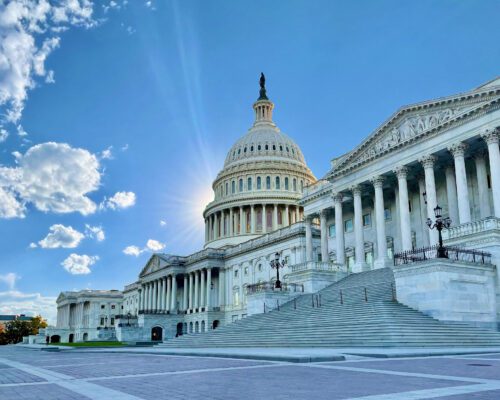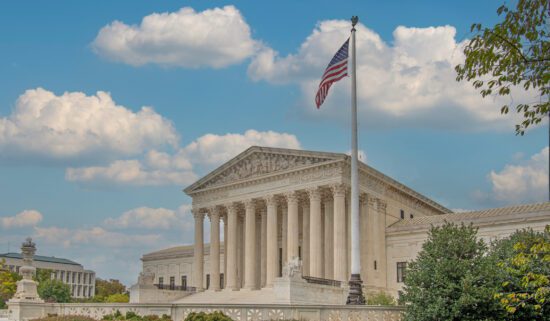On Wednesday, the Senate Judiciary Committee held a hearing on the Equality Act. The ERLC submitted written testimony for the hearing’s official public record opposing the bill.
Last month, the U.S. House of Representatives voted in favor of a controversial bill. The vote was 224-206, with all Democrats and three Republicans voting in favor of the legislation. On Wednesday, Senate Majority Leader Chuck Schumer (D–N.Y.) used a Senate rule called “Rule 14” that allows a bill to bypass a Senate committee and be placed directly on the Senate Calendar of Business. This means that, even though the Judiciary Committee held a hearing today, Leader Schumer could bring H.R. 5 to the floor at any point.
What is the Equality Act?
This legislation, filed as H.R. 5, seeks to expand the definition of “sex” to include “sexual orientation” and “gender identity” (SOGI) and would revise every title of the Civil Rights Act of 1964 to add these categories as new protected classes in the federal code. Last Congress, the Equality Act passed in the House, but the bill died in the Senate.
The bill defines “sexual orientation” as homosexuality, heterosexuality, or bisexuality, and “gender identity” as the gender-related identity, appearance, mannerisms, or other characteristics of an individual, regardless of the individual’s sex at birth.
The bill also explicitly states that, “The Religious Freedom Restoration Act of 1993 (42 U.S.C. 2000bb et seq.) shall not provide a claim concerning, or a defense to a claim under, a covered title, or provide a basis for challenging the application or enforcement of a covered title.”
What does this bill mean for religious liberty?
The ERLC believes this bill represents the most significant threat to religious liberty ever considered in the United States Congress.
This bill would substantially undermine religious liberty protections in the United States. America has long been a place where people with different views and beliefs have lived at peace alongside each other. Though America has not perfectly lived up to this ideal of a shared nation, it was central to our founding as persecuted religious minorities sought safe harbor in this land. Though cleverly named, the Equality Act is out of step with that American ideal. Equality cannot be achieved while eliminating other basic, fundamental freedoms. Of particular note, the bill would essentially gut the 1993 Religious Freedom Restoration Act (RFRA), a bill which passed with broad bipartisan support and was signed by President Clinton.
By undermining RFRA, H.R. 5 would force faith-based child welfare organizations to abandon their deeply held religious beliefs or be shut down by the state. The state-forced closures of such agencies is especially detrimental at a time when multiple crises—including the COVID-19 pandemic and the ongoing opioid epidemic—have led to increases in the number of children in need of services.
What are the pro-life concerns in the Equality Act?
As ERLC noted in the written testimony to the judiciary committee, the Equality Act would be the most pro-abortion bill ever passed by Congress.
The Equality Act would force healthcare workers and pro-life healthcare providers to participate in and provide abortions. Central to a Christian’s understanding of government is that government exists to secure rights granted by God. One of these inalienable rights is the freedom of conscience, not to be infringed by the state. H.R. 5 would redefine the term “sex” to also include “pregnancy, childbirth, or a related medical condition.” This language would roll back federal law that protects the consciences of pro-life nurses and physicians who object to participating in abortions because of their deeply held religious or moral beliefs. These conscience protections carry decades of bipartisan consensus—a consensus that no person should be compelled to participate in an act they believe to be gravely immoral.
What happens next with this bill?
The bill currently faces many obstacles to passage in the Senate.
In the Senate, Susan Collins of Maine was the only Republican in 2019 to co-sponsor the bill while Joe Manchin of West Virginia was the sole Democrat who was not a co-sponsor. Collins said this past February that she will not co-sponsor the legislation in the U.S. Senate this year. “There were certain provisions of the Equality Act which needed revision,” said Collins. “Unfortunately the commitments that were made to me were not [given] last year.”
Manchin also said in 2019 he would not support the legislation without changes. “I strongly support equality for all people and do not tolerate discrimination of any kind. No one should be afraid of losing their job or losing their housing because of their sexual orientation,” said Manchin. “I am not convinced that the Equality Act as written provides sufficient guidance to the local officials who will be responsible for implementing it, particularly with respect to students transitioning between genders in public schools.”
When the bill was introduced in the Senate in 2019, the GOP held the majority (53 seats) and Majority Leader Mitch McConnell refused to allow the bill to be voted on. This year the Senate is evenly divided, with 50 Republicans, 48 Democrats, and two Independents (Bernie Sanders of Vermont and Angus King of Maine) who caucus with the Democrats. If the Senate voted on the measure and Collins voted in favor while Manchin opposed, the result would be a 50-50 tie, which would be broken by Vice President Kamala Harris.
But before the bill would even come up for a vote, the bill would have to overcome a filibuster, an attempt to block or delay Senate action on a bill or other matter. The only formal procedure that Senate rules provide for breaking a filibuster is invoking Rule 22, which requires 60 members to end debate on most topics and move to a vote. This Senate rule is the reason almost all partisan legislation in the Senate, with a few notable exceptions, requires 60 votes rather than a 51 vote majority.
Key Resources
- Written Testimony of the Ethics and Religious Liberty Commission United States Senate Committee on the Judiciary Hearing on H.R. 5
- What is the Equality Act?
- ERLC Opposes the Equality Act
- Explainer: House votes in favor of the Equality Act
- Will the Equality Act be the end of female sports?
- The Equality Act: A dangerous law with a clever name
- The Equality Act Conundrum• The Equality Act Accelerates Anti-Christian Bias









